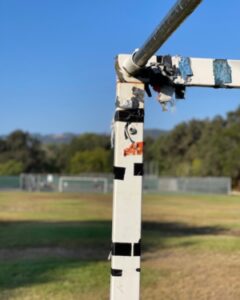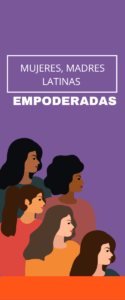Collectively We Are Not Okay, But We Will Be - Together. / Colectivamente no estamos bien, pero lo estaremos - unidos.
(Español abajo)
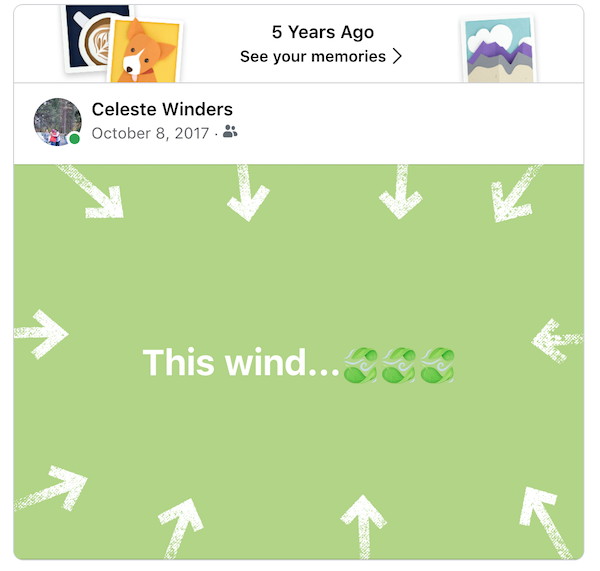
On October 8, 2017 I posted about the wind, not knowing that in just a matter of a couple hours our community would be engulfed in flames (or threatened with being engulfed) and Sonoma Valley, Kenwood, Oakmont and Santa Rosa would be evacuating all at once with only minutes to get out. Every year Facebook reminds me of this moment in time, and every year I can physically feel this moment when the air and the valley felt very unsettled. I remember then seeing others posting similar feelings and unknowingly we all were beginning to experience what would soon be a collective trauma.
The days before all felt so normal and when we reflect and talk, this piece of our collective story stands out. The Glen Ellen Village Fair had just happened with music and community and less than 24 hours later homes were gone, our beloved Dunbar Elementary School lost it's garden, outdoor stage, kindergarten playground and the amazing fire teams saved our school even though flames licked the walls of the kindergarten room. The town went from a parade and town fair, to evacuated and enveloped in smoke and an orange glow that remained for what felt like an eternity. Many of us were struggling to locate neighbors, classmates, teachers and familiar faces. It was scary and disjointed and the grown ups were trying desperately to reassure the kids that it was going to be okay - so as adults we suppressed our own fears so we could reassure them and help them feel safe.
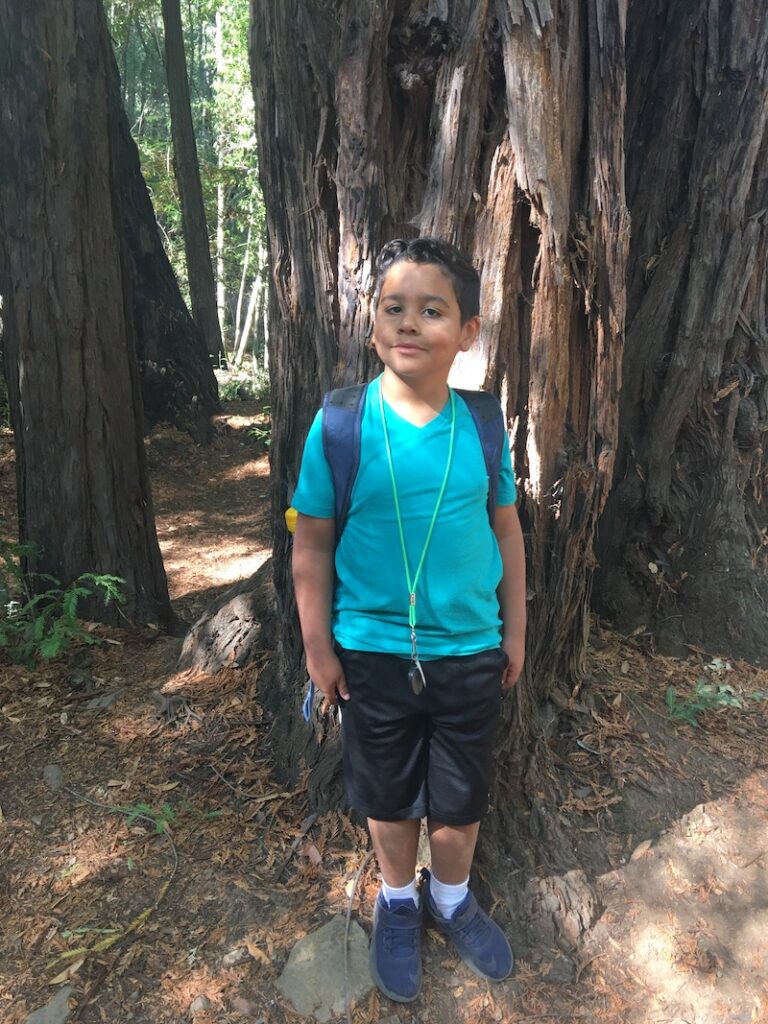
On the Friday before the fire, 48 hours before our world changed, I had taken my youngest son on the 3rd grade Sonoma kid tradition: the field trip to Bouverie Preserve. He was SO excited to go with Ms. Magnani and his friends to the place where his big brother had become a Juniper junior docent and had told him all about the magical pygmy forest, the waterfall, the animals and the many wonders that resided in this place you got to go when you were in 3rd grade. Za'id and his class were the last class to attend this field trip before the fires - it's strange how all our lives are now defined by "before" and "after" the fires. That Friday before the fires, I had loaded up my Honda Pilot with excited little people who all talked loudly at the same time telling me at a rapid pace about what they saw and who saw it first. Especially the poop... who saw what kind of animal poop was the number one topic. As we drove down the long Bouverie dirt driveway on our way back to Dunbar School, a little classmate of his said to me "Hey Za'id's mom, you know what? Did you know I am the luckiest kid in the whole class? You know why? I get to live across the street from Bouverie!" All the kids in the car and myself remarked at how lucky she is and we talked about how great it must be to live there. She told me about the lizards she caught and getting to walk from her house to the regional park.
This conversation replays in my mind often, because as we all know those homes did not survive the fire but I am beyond grateful all the people were safe. Then I feel this simultaneous sadness because so many of those neighbors and friends were unable to come back to our valley due to the housing crisis. It also replays because I too was once a child at Dunbar School who had her house burn down and I know that 40 years later that experience still is with me - again, we carry this scary experience that impacts us as individuals and as a community. It's also important to know that this particular little friend really understood my son and that day she had helped him and looked out for him. He is autistic so field trips could be hard, she was his little friend that stuck with him and reminded other friends to have more quiet voices in his ear. His 3rd grade class was an amazing group of kids led by a teacher in a school that made inclusion part of its foundation - where their mornings began each day with Ms. Magnani greeting everyone with "Good morning friends," and no matter who you were, when you heard that greeting ring down the halls of Dunbar School you would feel like she was definitely talking to you.
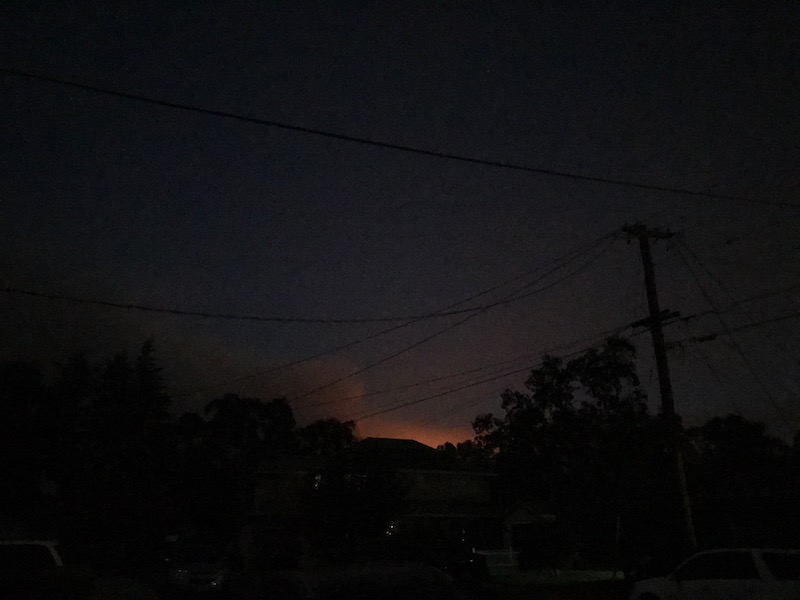
For days and into the weeks that followed, each of us experienced some individual version of wildfire trauma while at the same time experiencing a collective trauma that rears it's head each year on October 8th. When our Facebook memories remind us of the normalcy we had felt, and then feelings of a strange feeling in the air, and then ultimately the posts looking for friends, telling relatives from far away we were safe, sharing that homes were lost, that our school survived, that Bouverie Preserve was forever changed, where to find shelter, water, masks, food, beds, clothes and most of all where we could find community again after being scattered into the physical wind. We are also reminded that some of our community members had to relocate out of the valley and that we still need to find solutions to the housing crisis, with a hope that they will come back and that those still struggling to stay in our valley will no longer struggle. We are reminded of how far we have come, but also how far in this journey we still have to go. We are reminded that communication, resources and recovery were not equitable, that the fires in real time put equity on center stage how a lack of equity can impact public safety. We need to reflect on the language justice aspect of the wildfires as an important lesson learned, and one that since has had critical change made thanks to the social justice workers in our county. We are reminded that laughter in a parade and fair can suddenly fade into evacuated streets - but that we still will find one another and return to those streets and be together again.
When the COVID pandemic came and the streets became eerily quiet yet again, we knew what to do. We talked openly and immediately about a lack of equity and we organized to ensure that no one gets left behind. Organizations like Food For All - Comida Para Todos were born and partnered with other non profits, community organizers, educators and families to again support one another through loss, fear, isolation and a collective trauma.
What I learned as an individual is that it's okay to say we are not okay. That we need to say we are not okay so that we can get and give the help to make it better. We need to acknowledge that it's really hard right now and that we will help one another. That we will have hard conversations about equity and we will take action to create equity where it is lacking. That we will not keep the collective trauma buried, and instead we will confront it head on with love, compassion and most importantly services that all of us can access. I want you to all know that I see you, I know you are not always okay and that you are trying - I am trying with you. That you will heal and we will heal. That if we talk about it, if we confront it, if we sit in the discomfort of it together, then collectively we will heal and we will make sure that we will be okay together. We will not leave anyone behind. We know what to do, we just have to do it and we will. I will do it with you. We will do this work together. We will be okay.
El 8 de octubre de 2017 publiqué un post sobre el viento, sin saber que en cuestión de un par de horas nuestra comunidad se vería envuelta en llamas (o amenazada de serlo) y que el Valle de Sonoma, Kenwood, Oakmont y Santa Rosa serían evacuados a la vez con solo minutos para salir. Todos los años Facebook me recuerda este momento, y todos los años puedo sentir físicamente este momento en el que el aire y el valle se sentían muy inquietos. Recuerdo que entonces vi a otras personas publicando sentimientos similares y, sin saberlo, todos estábamos empezando a experimentar lo que pronto sería un trauma colectivo.
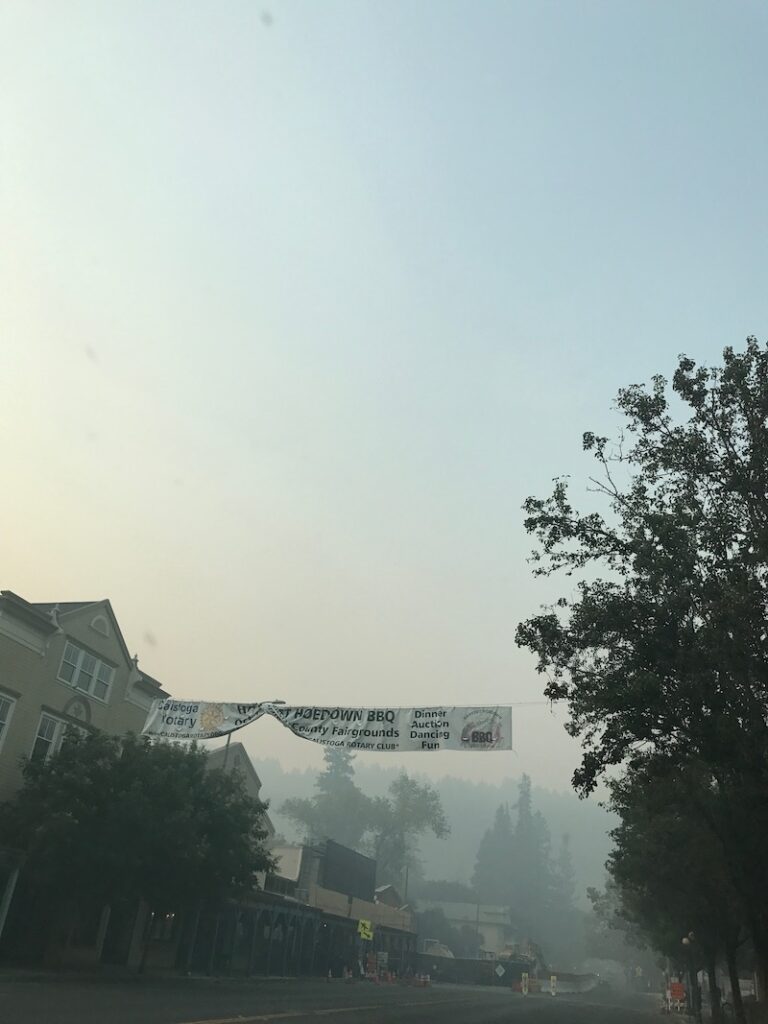
Los días anteriores parecían tan normales y cuando reflexionamos y hablamos, esta parte de nuestra historia colectiva destaca. La feria del pueblo de Glen Ellen acababa de celebrarse con música y comunidad y menos de 24 horas después las casas habían desaparecido, nuestra querida escuela primaria Dunbar perdió su jardín, el escenario exterior, el patio de recreo del jardín de infancia y los increíbles equipos de bomberos salvaron nuestra escuela a pesar de que las llamas tocaron las paredes de la sala del kinder. El pueblo pasó de tener un desfile y una feria municipal, a estar evacuado y envuelto en humo y un resplandor naranja que permaneció durante lo que pareció una eternidad. Muchos de nosotros nos esforzamos por localizar a vecinos, compañeros de clase, profesores y caras conocidas. Era aterrador e inconexo y los adultos intentaban desesperadamente tranquilizar a los niños diciéndoles que todo iba a salir bien, así que, como adultos, reprimimos nuestros propios miedos para poder tranquilizarlos y ayudarles a sentirse seguros.
El viernes anterior al incendio, 48 horas antes de que nuestro mundo cambiara, había llevado a mi hijo menor a la tradición de los niños de 3er grado de Sonoma: la excursión a la Reserva Bouverie. Estaba muy emocionado por ir con la Sra. Magnani y sus amigos al lugar donde su hermano mayor se había convertido en docente junior de Juniper y le había contado todo sobre el mágico bosque pigmeo, la cascada, los animales y las muchas maravillas que residían en este lugar al que se podía ir cuando se estaba en 3er grado. Za'id y su clase fueron la última clase que asistió a esta excursión antes de los incendios; es curioso cómo todas nuestras vidas se definen ahora por el "antes" y el "después" de los incendios. Aquel viernes antes de los incendios, había cargado mi Honda Pilot con gente pequeña y emocionada que hablaba en voz alta al mismo tiempo contándome a un ritmo rápido lo que había visto y quién lo había visto primero. Especialmente la caca… quién vio qué tipo de caca de animal fue el tema número uno. Mientras conducíamos por el largo camino de tierra de Bouverie de regreso a la escuela Dunbar, un pequeño compañero de clase me dijo: "Oye, mamá de Za'id, ¿sabes qué? ¿Sabes que soy el niño más afortunado de toda la clase? ¿Sabes por qué? Me toca vivir enfrente de Bouverie". Todos los niños del coche y yo mismo comentamos lo afortunada que es y hablamos de lo genial que debe ser vivir allí. Me habló de las lagartijas que cazaba y de que podía ir andando desde su casa hasta el parque regional. Esta conversación se repite a menudo en mi mente, porque como todos sabemos esas casas no sobrevivieron al incendio, pero estoy más que agradecida de que toda la gente estuviera a salvo. Pero al mismo tiempo siento tristeza porque muchos de esos vecinos y amigos no pudieron volver a nuestro valle debido a la crisis inmobiliaria. También se repite porque yo también fui una niña de la escuela Dunbar a la que se le quemó la casa y sé que 40 años después esa experiencia sigue conmigo - de nuevo, cargamos con esta experiencia aterradora que nos impacta como individuos y como comunidad. También es importante saber que esta amiguita en particular realmente entendió a mi hijo y ese día lo ayudó y cuidó de él. Él es autista, por lo que las excursiones pueden ser difíciles, ella fue su amiguita que se quedó con él y le recordó a otros amigos que debían tener más voces tranquilas en su oído. Su clase de 3er grado era un grupo increíble de niños liderados por una maestra en una escuela que hacía de la inclusión parte de sus fundamentos - donde sus mañanas comenzaban cada día con la Sra. Magnani saludando a todos con "Buenos días amigos", y no importaba quién fueras, cuando escuchabas ese saludo sonar por los pasillos de la escuela Dunbar sentías que definitivamente te estaba hablando a ti.

Durante los días y las semanas que siguieron, cada uno de nosotros experimentó alguna versión individual del trauma del incendio forestal y, al mismo tiempo, el trauma colectivo que aparece cada año el 8 de octubre. Cuando nuestros recuerdos de Facebook nos recuerdan la normalidad que habíamos sentido, y luego la sensación de un sentimiento extraño en el aire, y finalmente los mensajes buscando amigos, diciendo a los familiares desde lejos que estábamos a salvo, compartiendo que los hogares se perdieron, que nuestra escuela sobrevivió, que Bouverie Preserve cambió para siempre, dónde encontrar refugio, agua, máscaras, alimentos, camas, ropa y, sobre todo, dónde podríamos encontrar la comunidad de nuevo después de haber sido dispersados en el viento físico. También se nos recuerda que algunos de los miembros de nuestra comunidad tuvieron que reubicarse fuera del valle y que todavía tenemos que encontrar soluciones a la crisis de la vivienda, con la esperanza de que vuelvan y de que los que todavía luchan por quedarse en nuestro valle dejen de hacerlo. Se nos recuerda lo lejos que hemos llegado, pero también lo lejos que nos queda en este viaje. Se nos recuerda que la comunicación, los recursos y la recuperación no fueron equitativos, que los incendios en tiempo real pusieron la equidad en el centro de la escena y que la falta de equidad puede afectar a la seguridad pública. Tenemos que reflexionar sobre el aspecto de la justicia lingüística de los incendios forestales como una importante lección aprendida, y que desde entonces se ha producido un cambio crítico gracias a los trabajadores de la justicia social en nuestro condado. Se nos recuerda que las risas en un desfile y una feria pueden desvanecerse de repente en las calles evacuadas, pero que aun así nos encontraremos y volveremos a esas calles y estaremos juntos de nuevo.
Cuando llegó la pandemia de COVID y las calles volvieron a estar inquietantemente silenciosas, supimos qué hacer. Hablamos abierta e inmediatamente de la falta de equidad y nos organizamos para garantizar que nadie se quedara atrás. Nacieron organizaciones como Food For All - Comida Para Todos, que se asociaron con otras organizaciones sin ánimo de lucro, organizadores comunitarios, educadores y familias para volver a apoyarse mutuamente en la pérdida, el miedo, el aislamiento y el trauma colectivo.
Lo que aprendí como individuo es que está bien decir que no estamos bien. Que tenemos que decir que no estamos bien para poder obtener y dar la ayuda necesaria para mejorar. Tenemos que reconocer que es muy difícil en este momento y que nos ayudaremos unos a otros. Que tendremos conversaciones difíciles sobre la equidad y que tomaremos medidas para crear equidad donde no la haya. Que no mantendremos enterrado el trauma colectivo, sino que lo afrontaremos de frente con amor, compasión y, sobre todo, con servicios a los que todos podamos acceder. Quiero que todos sepan que los veo, que sé que no siempre están bien y que lo están intentando, yo lo estoy intentando con ustedes. Que se curarán y nos curaremos. Que si hablamos de ello, si nos enfrentamos a ello, si nos sentamos juntos en la incomodidad de ello, entonces colectivamente sanaremos y nos aseguraremos de estar bien juntos. No dejaremos a nadie atrás. Sabemos lo que hay que hacer, sólo tenemos que hacerlo y lo haremos. Lo haré con ustedes. Haremos este trabajo juntos. Estaremos bien.
